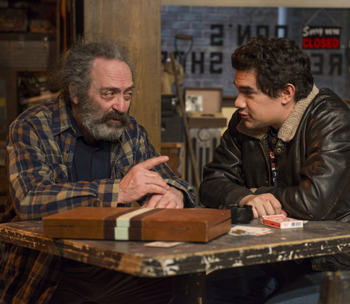
Unlike moving into a new house, closing down a theater is not just a matter of giving the post office a forwarding address and handing over the keys to the new tenants. The second-floor loft over the convenience store at Broadway and Sheridan has been so long associated with the Mary-Arrchie Theatre Company (despite the difficulty playgoers unaccustomed to city streets still encounter trying to find its entrance) that its shuttering after thirty years requires nearly as much planning as a new production.
According to founder Rich Cotovsky, the company's first quarters were a third-floor loft around the corner in the historic Isaac Ettleson building upstairs from the igLoo Theatrical Group (whose warren of oddly-shaped studios would later be occupied by Strawdog Theater). Other transient way-stations included the Broadway barroom Amethyst and a crumbling storefront on Loyola Avenue, before the group of artists with the funny name returned to Lakeview to put down roots.
In the years immediately preceding the tenancy of its long-term residents, the loft that would become their cradle of creativity was the dance studio of the Joseph Holmes Dance Company. An early Mary-Arrchie play staged in their new quarters was James McLure's Lone Star, set in the parking lot of a Texas honky-tonk where three drunken buddies proceeded to spit beer, tread candy bars and inflict damage--or disrespect, anyway--on its pristine hardwood floor.
"Eventually we covered the floor with plywood--though now that the building is going down, preserving the surface for another dance troupe someday is a moot point. First, though, we configured the dressing rooms around the mirrors and put a shower in one of the bathrooms. We sectioned off an entrance to the lobby, constructed risers and painted the walls black."
The real-life Angel Island is located in California's San Francisco Bay, where it became an entry point for millions of Asian immigrants, earning it the description of "the West Coast Ellis Island."
"A trick I learned from igLoo was to give your physical space a name, so that people could easily distinguish between your own company's productions and those of rentals." Cotovsky confides, "What we wanted was a name beginning with 'A' so that it would appear at the top of the newspaper listings. We thought about 'Alcatraz' and 'Albatross' and all these names with negative connotations, until finally Ted Goodman came up with 'Angel Island'."
The David Cromer-directed production of Kirk Lynn's Cherrywood: The Modern Comparable proposed fifty actors and fifty audience members sharing a room barely bigger than a double garage, exceeding the company's record for the most bodies per square foot (previously held by their 1990 production of Sidney Kingsley's Detective Story), and during the annual Abbie Hoffman Died for Your Sins festivals--a three-day weekend jamboree with performances running back-to-back almost literally round the clock-- one would often find crowds of people spilling down the stairs onto the sidewalk. Does Angel Island have hidden pockets of space that visitors don't often see?
"We've held parties and benefits here, and several people have lived in it over the years as 'caretakers.' For most of our stay, we had a big attic that spanned the entire loft, which we used for storage until our last landlord asked us to clean it out. Some of our current inventory will go into a storage facility, some we hope can be sold to other theaters, and the rest will be donated or left to the demolition crew."
Doesn't closing down a theater business also require drawing up legal safeguards to protect the name itself from some upstart troupe someday calling itself "Mary-Arrchie" and usurping your 30-year history? Cotovsky is unperturbed, "The evolution of our name is so personal, and the history attached to it so specific, I doubt anyone would dare take on the task of assuming it. Of course, if one of our own went forward with it, I would welcome that."
Thirty years of damn-the-torpedoes-the-show-must-go-on determination makes for many stories and memories, like the production of Tracers during the devastating summer of 1995, when temperatures reached catastrophic levels exceeding 100 degrees for nearly two weeks, and the night of final preview for the play about soldiers suffering in Viet Nam coincided with the night before the second-floor loft was to receive its air-conditioning unit from an overworked league of installers. (As an army veteran of that era, myself, I was no stranger to stifling heat, but my fellow spectators were grateful for the jars of ice water and facecloths distributed to the evening's attendees.)
Cotovsky recalls another tale, this one involving the intrusion of urban wildlife: "It was the mid-1990s when [film director] John McNaughton was using our space to rehearse Normal Life. While they were out on the stage, I was in the office in back and I noticed that a possum had got in, probably from one of the parks or the cemeteries farther west. Erica Wood and Guy Van Swearingen and I tried to chase it out with a stick, but finally, I phoned Animal Control, who sold me a live-trap, where we caught the critter with a bait of raw fish (after failing to lure our prey with peanut butter or canned tuna). I later released it near a drainage canal in Evanston.
"I figured that was the end of it, but in 1999, I had a part in the film Stir of Echoes. One day, I was sitting next to Kevin Bacon in the make-up trailer, when he looked over and said, 'Hey, I hear your theater has a possum in it'." Steve Jones was the assistant director for both movies and must have told everybody the story.
American Buffalo runs at Angel Island through April 17.
Mary Shen Barnidge
Contributing Writer

 Follow Us On Twitter
Follow Us On Twitter